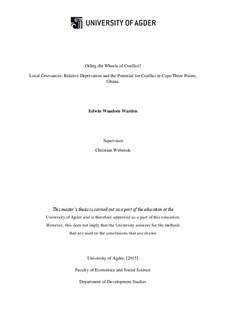| dc.description.abstract | Natural resource, particularly oil, has been predicted to be a core factor of internal conflicts in
the post-cold war era (Le Billon, 2001; Klare, 2001). This thesis explores the potential for
conflict in new and emerging petro-states where recent oil discoveries have raised concerns
about the risk of oil conflict occurring. The relative deprivation theory (Gurr, 1970) serves as
the main theoretical point of discussion for this study.
Using a case study of Cape Three Points in Ghana, the study empirically examines how
community level grievances, in terms of challenges and expectations connected with the
discovery and production of oil, increase the potential for conflict in petro-states. Based on a
mixed method research strategy, qualitative interviews and quantitative responses were
analysed to shed light on local grievances, relative deprivation and the potential for conflict in
Cape Three Points.
The study finds that the prevalence of unfulfilled expectations and rise in oil-related challenges
has resulted in community level grievances in Cape Three Points. Consequently, local
grievances have generated a feeling of relative deprivation among community members, when
compared to other oil-bearing coastal communities, the government and the oil companies.
However, the study suggest that the high level of frustration that has resulted from the feeling
of relative deprivation has not directly translated into aggressive, violent conflict, although the
potential remains high. Rather, a contrasting opinion on the use of aggression/violence to
address grievances and relative deprivation exists among community members. Age, gender
and collective attitude accounts for the contrasting opinion. On the basis of the analysis, the
study concludes that from a relative deprivation perspective, conflict tendencies are evident in
Cape Three Points, however, the onset of violent conflict seems unlikely, especially in the short
term.
Keywords: Natural Resource, Conflict, Relative deprivation. | nb_NO |
